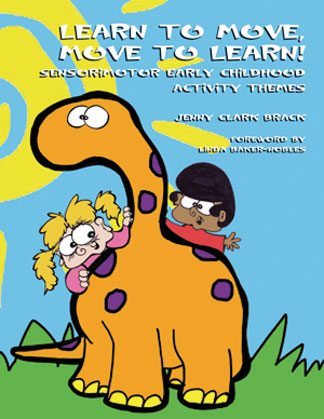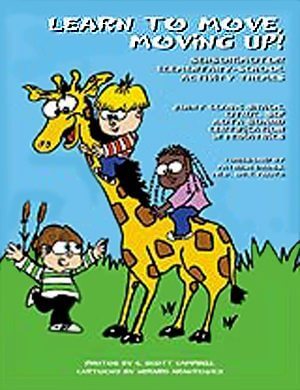
Clark, Jenny, OTR/L
Jenny Clark, OTR/L, is a licensed pediatric Occupational Therapist with over 16 years experience in school settings. Mrs. Clark currently works for Three Lakes Educational Cooperative where she is a Staff Occupational Therapist, and she owns a pediatric therapy private practice Jennys Kids, Inc. She received her Bachelors degree in Occupational Therapy and graduated with distinction from the University of Kansas in 1990. Since then, Mrs. Clark has worked as an independent contractor, a school-based occupational therapist, a speaker, a private practitioner, and an author. She has written journal articles that have been published in professional journals such as OT Practice, Occupational Therapy Forum, and Journal of Occupational Therapy Students. Additionally, she has written a book on Sensory Processing entitled Learn to Move, Move to Learn: Sensorimotor Early Childhood Activity Themes published by Autism Asperger Publishing Company. In addition, she has published two DVDs Learn to Move: Dinosaurs (A companion to her book) and Sensory Processing Disorder Kit: Simulations and Solutions for Parents, Teachers, and Therapists. She has spoken both nationally and locally on a variety of topics, including sensory integration, learning disabilities, attention deficit disorders, and handwriting skills.
Ready S.E.T. Go!
Sensorimotor Themes For Children
In this seminar, healthcare professionals, educators, and parents will learn characteristics about each sensory system, signs/symptoms of Sensory Processing Disorder, and practical strategies for application in childrens daily routines, along with current research to support sensory processing practices. In addition, attendees will learn how to apply sensorimotor activities, as described in Learn to Move, Move to Learn, to both school and home settings. This unique approach is geared toward serving young children in an inclusive environment with a transdisciplinary approach. The sensorimotor groups are planned to provide experiences to stimulate and integrate the underlying sensory systems in the human body, which incorporate activities and experiences using motor, cognitive, communication and social skills to enhance learning. Adaptations will be discussed for children with Autism Spectrum Disorder, Down Syndrome, Cerebral Palsy, and Developmental Delay. Hands on activities will enrich the learning process for participants. Attendees will learn skills and strategies they can immediately use in their classroom and home settings.
Listen, look, feel, taste, smell! Sensory input surrounds us. Just as intellectual abilities vary from child to child, sensory processing abilities also vary widely. Some children with a sensory processing disorder are unable to tune out all the information their bodies perceive, while others are unable to perceive some of the information that they need to do their schoolwork. The noise of the heater distracts Cathy, and she misses the homework assignment. The posters fluttering on the wall keep Joe from concentrating on his math problems. Brittanys legs and arms feel like they have to move – she cant focus on her reading. Imagine all the sensory input that must be processed to dynamically engage in daily activities. Sensory processing is the reason that most people can perceive and use this information while maintaining a just right state of alertness. A few children will respond to minor changes in the environment or schedule while others may need more extensive Sensory Strategies which may include quiet times away from the class, increased movement opportunities, oral motor activities, and/or heavy work opportunities incorporated in the their daily routines.
COURSE OBJECTIVES
- Review sensory systems and signs/symptoms of Sensory Processing Disorder as well as current research in this field.
- Discuss practical ideas for implementing sensory strategies into learning environments and within the context of childrens daily routines
- Discover how Ready S.E.T. Go! facilitates readiness skills for motor, sensory, language, cognitive and social development in both educational and home environments.
- Experience first-hand what it feels like to have a sensory processing disorder
- Discuss how to adapt activities for a variety of diagnoses.
- Create original lesson plans for sensorimotor/sensory processing group activities.
COURSE CONTENT
OVERVIEW OF SENSORY PROCESSING
- Vestibular
- Proprioception
- Tactile
- Visual
- Auditory
- Motor Planning
- Olfactory
- Taste/Oral Tactile
SENSORIMOTOR THEMES
- Sensory Integration Model
- Theme & Literature based
- Transdisciplinary Approach
- Inclusive environments
- Structure
- Transitions
- Video
SCHOOL READINESS SKILLS
- Cognitive
- Language
- Sensory
- Motor
- Social/Emotional
THEME EXAMPLES
- Collaboration/planning
- Therapeutic Tools
- Materials/Supplies
- Activity Practices
- Oral Motor Ideas
WORKING WITH SPECIAL POPULATIONS
- Autism Spectrum Disorder
- Cerebral Palsy
- Down Syndrome
- Developmental Delay
- Adaptations
- Dynamic problem solving
- Functional outcomes
- Case Studies
TAKE HOME LESSON PLANS
-
Learn to Move, Moving Up! Sensorimotor Elementary-School Activity Themes
The centerpiece of the book consists of 30 sensorimotor, theme-based lesson plans that include literacy and curriculum suggestions for teachers, and suggests ways that they can be incorporated into busy elementary school schedules and environments.
$48.95 Product Details »


